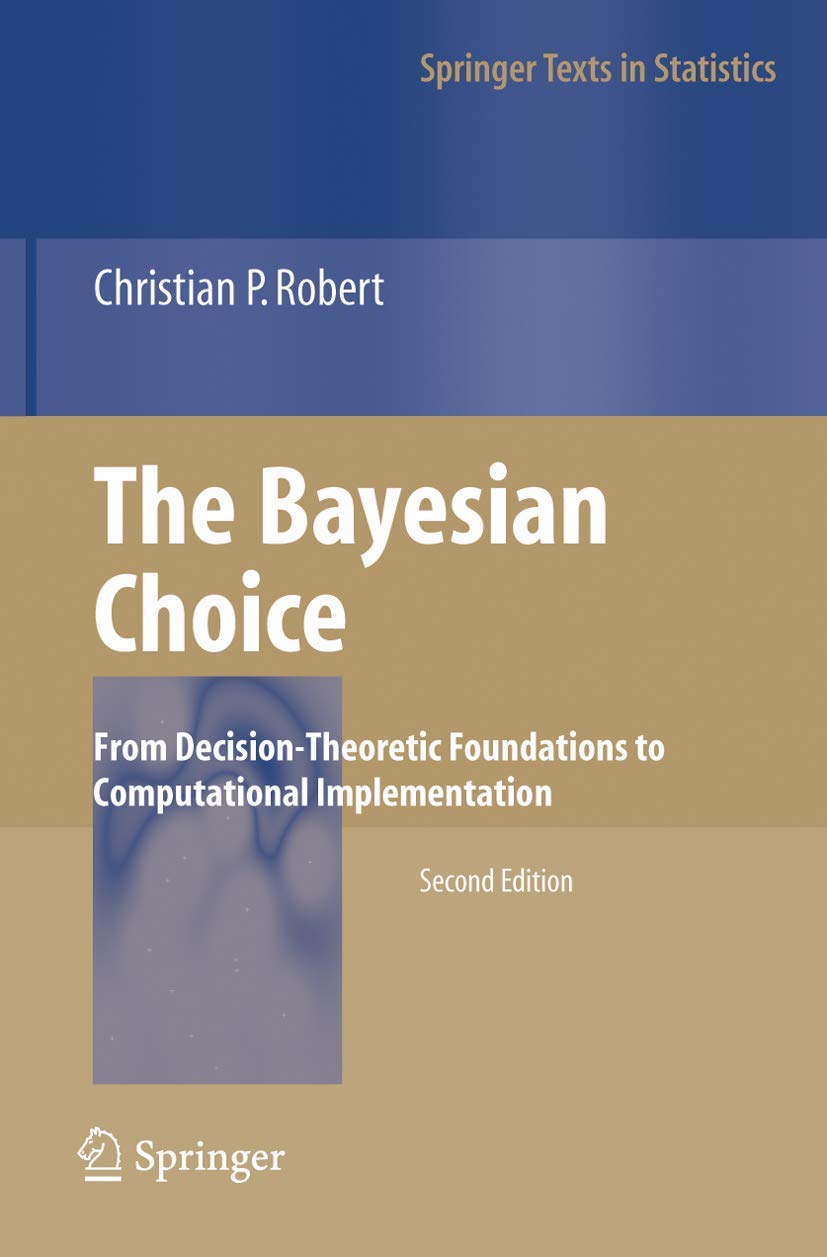Customer Services
Copyright © 2025 Desertcart Holdings Limited
Desert Online General Trading LLC
Dubai, United Arab Emirates


Full description not available
A**R
The right place to start for Bayesian statistics.
This is a very well-respected book. Its status as the winner of the 2004 DeGroot Prize is evidence of its excellence. If you want to develop a strong background in Bayesian statistics, then this is the book you want. This book takes a much more rigorous approach to Bayesian statistics than Bayesian Data Analysis. Robert develops both the decision theoretic background of Bayesian statistics up to the level of The Theory of Point Estimation by Lehmann and MCMC computation including practical implementation issues. The author is to be commended for writing a book that contains very advanced material from mathematical statistics, but the book can be used by a wide audience since the parts on Bayesian computation are easily accessible. If you want to become serious about Bayesian statistics, then this will be a very useful book to you. Another book that may be of interest is Monte Carlo Methods by Robert and Casella.
D**E
Great goods
The package's condition was good.
D**9
A Book for Theoreticians
I feel like the intended audience of this book is more the authors peers than it is graduate students: the author assumes you have a solid theoretical foundation in bayesian statistics. Much of the discourse is about the reasons for choosing a bayesian framework instead of a frequentist framework. For those who are already familiar with the theoretical underpinnings, this book likely serves as a great argument for bayesian statistics and is a nice unifying framework for the key concepts. It is clear that the author is passionate about the topic, very knowledgeable about the material and very precise in presenting the material. His arguments about the bayesian choice are well-reasoned and well-balanced.However, for those who want to apply bayesian statistics to a problem in their own research area, there are likely better books. The author uses many concepts before introducing them. In many cases, the introduction of a concept is so brief as to only serve as a reminder for those who already know the topic well. I have taken several graduate courses in statistics and I have studied most of the topics listed in the table of contents, yet I find this book difficult to follow.I feel reviews are often colored by the (often unknown) background of the reviewer, so I'm including a little of my background: I have a phd in computer science and my thesis topic was computer vision. I am now working on machine learning problems and when I bought this book I felt a stronger background in bayesian statistics would help me.
B**S
good and deep
This book is very good and very deep. The only problem is that it demands a lot of time and commitment to finish it.
M**N
Not impressed
I agree with the "book for theoreticians" review. The focus is NOT on useful data-based application, but on abstract infinite properties. The asides are hit or miss. The exposition is cut between poorly motivated and poorly explained examples that range dramatically in complexity. It ruins the pace. Also there are plenty of typos. The author defines the well-known St Petersburg paradox using a 3^n payout instead of 2^n.
M**K
excellent text on Bayesian methods in statistical decision theory
Robert is the author or co-author of a number of excellently written statistical texts from a Bayesian viewpoint. This text is no exception. It was quite popular in its first edition in 1994 (a translation and correction of an earlier text in French). The rapid advancement in Bayesian applications and theory due to the success of computer-intensive methods such as Markov Chain Monte Carlo Methods justifies an update in 2001.Chapter 7 on model choice is entirely new and Chapter 6 on Bayesian calculations is extensively revised. Chapter 10 on hierarchical models and empirical Bayes extensions has been supplemented with a number of recent examples. Bayesian hierarchical models are now being used in the development of clinical trials particularly in the medical device industry.This is an advanced graduate text in Bayesian statistics and has a wealth of references to the literature. In that respect it is very similar to the fine text by Bernardo and Smith (1994) "Bayesian Theory" but is a little more current.An important reference for all statistical researchers, I highly recommend it for a graduate course text in Bayesian methods as well as for a reference book.
R**O
A Succesfull Attemp
Well, I never thought that Bayesian Statistics was an easy thing. And actually it isn't, but there always several approaches to complex subjects, and the right way is to be detailed, precise and still as simple as possible. That's what I got when reading this book. Obviously the subject itself imposes some level of difficulty, but the book is the right tool to overcome it. I'm simply fascinated by the possibilities I'm learning to understand and apply.
A**R
A thorough description of bayesian statistics
The book is a good introduction to bayesian decision theory. The plenty examples in the book are helpful in the understanding of the subject, but one could wish a more detailed description of the bayesian paradigm. People with little experience with statistics should maybe consider another book.
S**R
Great book for a detailed overview of the bayesian paradigm
It is a great book, for people with some statistical background.
G**N
Excellent
Christian Robert est une référence dans le domaine, de même que cet ouvrage (destiné toutefois aux étudiants/professionnels ayant au minimum un niveau licence en statistique...). À noter, le dernier chapitre qui est une discussion "philosophique" du choix bayésien très intéressante.
Trustpilot
2 days ago
4 days ago